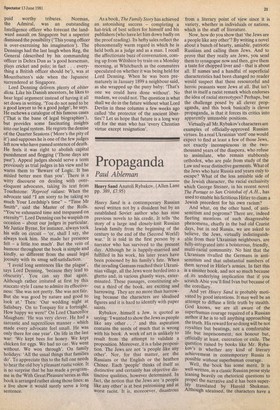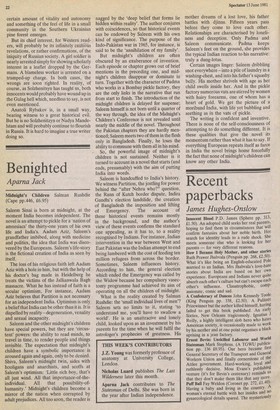Propaganda
Paul Ableman
Heavy Sand Anatoli Rybakov, (Allen Lane pp. 389, £7.95) Heavy Sand is a contemporary Russian novel written not by a dissident but by an established Soviet author who has nine previous novels to his credit. It tells 'the story of a large and closely-knit Russian Jewish family from the beginning of the century to the end of the (Second World) war.' It is told in the first person by a narrator who has survived to the present day. Although he is happily-married and fulfilled in his work, his later years have been poisoned by his family's fate. When the invading Gemans reached their Ukraninian village, all the Jews were herded into a ghetto and, in various ghastly Ways, exterminated. These passages, constituting about a third of the book, are exciting and harrowing. They are no more than harrowing because the characters are idealised figures and it is hard to identify with paper saints.
Rybakov, himself a Jew, is quoted as saying: 'I wanted to show the Jews as people like any other . .' and this aspiration contains the seeds of much that is wrong with his book. A work of art is unlikely to result from the attempt to validate a proposition. Moreover, it is a false proposition. The Jews are not 'a people like any other'. Nor, for that matter, are the Russians or the English or the heathen Chinee. Each !people' thinks of itself as distinctive and certainly has objective distinctive qualities, however determined. In fact, the notion that the Jews are 'a people like any other' is at best patronising and at worst racist. It is, moreoever, disastrous from a literary point of view since it is variety, whether in individuals or nations, which is the stuff of literature.
Now, how do you show that 'the Jews are a people like any other'? By writing a novel about a bunch of hearty, amiable, patriotic Russians and calling them Jews. And to prove that they really are Jews, you send them to synagogue now and then, give them a taste for chopped liver and — that is about all. If names and a handful of superficial characteristics had been changed no reader would suspect that these resourceful and heroic peasants were Jews at all. But isn't that in itself a racist remark which endorses the idea of racial stereotypes? Perhaps, but the challenge posed by all clever propaganda, and this book basically is clever propaganda, is that it forces its critics into apparently untenable positions.
• Virtually all Mr.Rybakov's characters are examples of officially-approved Russian virtues, In a real Ukrainian `stetr one would expect to find at least a few of those Jews, not exactly inconspicuous in the twothousand years of the diaspora, who refuse to assimilate, who remain stubbornly orthodox, who are pale from study of the Law and wear distinctive garments. What of the Jews who hate Russia and yearn only to escape? What of the less amiable side of the Jewish character, the racial exclusivity which George Steiner, in his recent novel The Portage to San Cristobal of A.H., has used to enable his fictitious Hitler to claim a Jewish precedent for his own racism?
And what, on the other hand, of antisemitism and pogroms? There are, indeed fleeting mentions of such disagreeable• phenomena, chiefly in the bad old Czarist days, but in red Russia, we are asked to believe, the Jews, virtually indistinguishable from their Ukrainian neighbours, are fully-integrated into a boisterous, friendly, multi-racial community. No hint that the Ukranians rivalled the Germans in antisemitism and that substantial numbers of them served in Hitler's armies. In fact this is a sinister book, and not so much because of its underlying implication that if you scratch Abie you'll find Ivan but because of the corollary. And yet Heavy Sand is probably motivated by good intentions. It may well be an attempt to diffuse a little truth by stealth. God knows, we are all aware of the superhuman courage required of a Russian author if he is to tell anything approaching the truth. His reward for so doing will be not royalties but beatings, not a comfortable life but imprisonment, not honour but, officially at least, execration or exile. The question raised by books like Mr. Rybakov's is whether any kind of literary achievement in contemporary Russia is possible without superhuman courage. Well, the book has some merit. It is well-written, in a classic Russian prose style leaning heavily on rhetorical questions to propel the narrative and it has been superbly translated by Harold Shukman. Although idealised, the characters have a certain amount of vitality and autonomy and something of the feel of life in a small community in the Southern Ukrainian pine forest emerges.
But its chief interest, for Western readers, will probably be its infinitely cautious revelations, or rather confirmations, of the iniquity of Russian society. A girl soldier is nearly arrested simply for showing scholarly interest in a leaflet dropped by the Germans. A blameless worker is arrested on a trumped-up charge. In both cases, the wrongs are soon righted. In reality, of course, as Solzhenitsyn has taught us, both innocents would probably have wound up in the Gulag hell which, needless to say, is not even mentioned.
Anatoli Rybakov is, in a small way, bearing witness to a great historical evil. But he is no Solzhenitzyn or Nadya Mandelstam and will probably continue to flourish in Russia. It is hard to imagine a true writer doing so.







































 Previous page
Previous page